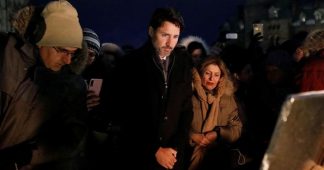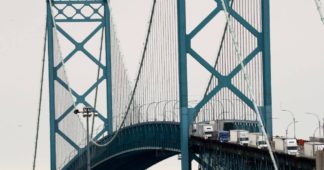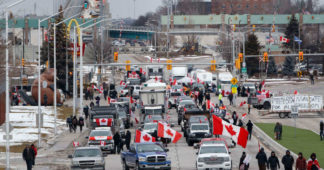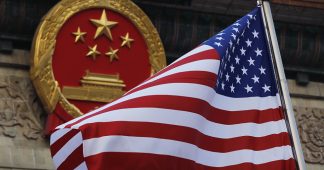After weeks of inaction against truckers paralysing life in Ottawa and across Canada, Prime Minister Justin Trudeau invoked the Emergencies Act and politicians and pundits went into overdrive trying to make sense of it. Not many succeeded. This is an exclusive article written by Radhika Desai for the New Cold War website.
By Radhika Desai
Published on NCW, Feb 15, 2022
___________________________
After weeks of inaction against truckers paralysing life in Ottawa and across Canada, Prime Minister Justin Trudeau invoked the Emergencies Act and politicians and pundits went into overdrive trying to make sense of it. Not many succeeded.
Why Trudeau took this step was not immediately clear. Many supported it. Many others did so while berating him for the delay in taking the step: New Democratic Party leader, Jagmeet Singh, called the delay a ‘failure of leadership’. Others, however, questioned whether it was necessary or right. For the Canadian Civil Liberties Association (CCLA), Trudeau had not met the ‘high and clear’ bar for invoking the Act: it should be used only where existing laws are inadequate. That they were not inadequate was clear since the Ambassador Bridge, the most important of all transportation links between Canada and the US, was cleared of protesters and trucks with a mere court injunction.
The CCLA also objected that the Act applies only when ‘the ability of the Government of Canada to preserve the sovereignty, security and territorial integrity of Canada’ is threatened. Do the protesters constitute such a threat? The element of menace is undoubtedly present in the so-called ‘Freedom Convoy’. It clearly leans to the hard right, contains white supremacists, Christian fundamentalists, Islamophobes, conspiracy theorists who declared their aim as being overthrow the government through non-parliamentary and electoral means. Such insurrectionism smacks of fascism. Moreover, the hacking of the GiveSendGo fundraising website revealed considerable foreign funding, with 52,000 US donors giving $3.62 million compared to 36,000 Canadians giving $4.3 million. This also raises the possibility that the US right-wing encouraging Trumpist, 6 January-style fascistic politics in Canada. What is not clear is how many protesters belong to the hard core of those committed to such objectives.
The real issue, however, is that the authorities are paralysed before the protesters. Will the Emergencies Act end that paralysis? For weeks, the law remained unenforced and few arrests were made. Many asked whether law enforcement would have been so lax had the protesters been left-wing, Indigenous or non-white. There is evidence of considerable sympathy for the protesters among police forces across the country. Perhaps this is because the electorally insecure prime minister and provincial premiers are unwilling alienate the largely suburban, white middle class the protesters appeal to. Trudeau’s minority government cannot afford to lose that support.
Why did Trudeau act when he did? He may have been forced into action after his phone call with US President Biden. That the Americans are unhappy about the trade disruption the protests have caused is plain from much US commentary on the subject. Such motives had already forced Ontario premier Doug Ford, otherwise reliant on the same suburban, white middle class voters that made up the ‘Ford Nation’ set up by his late brother, to clear the Ambassador Bridge just days before.
While he was at it, Trudeau may also have taken the opportunity to put the opposition Conservative Party in a fix. Erin O’Toole was replaced as Conservative leader for not supporting the protests by an interim leader who clearly supports them but the divisions remain. The traditional party of law and order is now home to a hard-right insurrectionist element that will oppose the Act in parliament while more traditional conservatives will support it. This division can give Mr Trudeau considerable political and electoral advantage.
However, any advantage Trudeau secures from dividing the Conservatives will fail to compensate when, as is likely, his melodramatic gesture falls flat or unfolds in a darkly farcical fashion. The plain fact is that the reluctance that Canadian authorities have shown in enforcing the law is not going to disappear simply because the Emergencies Act is in force. Many Western premiers have already refused to use it and are, instead, using the opportunity created by the protests in lifting more pandemic restrictions though the danger is far from gone. Since the ordinary laws of Canada were already adequate to deal with the protesters’ infractions, what is worrying is what the increased authoritarian powers will be used for.
The only really useful element of power that the Emergencies Act gives the government is the right to use anti-money laundering and anti-terrorism financing mechanisms, particularly the Financial Transactions and Reports Analysis Centre of Canada (FINTRAC). However, the protesters can use crypto currencies, long left deliberately unregulated by monetary authorities. As for FINTRAC, as a critic noted some years ago, it has ‘been called out … for weak laws and half-hearted enforcement.’ Much financial skullduggery hides behind privacy laws and these groups are bound to exploit it
Canada appears a long way from Trumpist fascism. However, one should recall that fascism does not storm bastions of power; it is let into power’s corridors by those in charge.
Today, Canada’s leaders appear as prone to do that as any others. Yesterday’s invocation of the Emergencies Act could come to count as Mr Justin Trudeau’s worst political decision.
Published at newcoldwar.org
We remind our readers that publication of articles on our site does not mean that we agree with what is written. Our policy is to publish anything which we consider of interest, so as to assist our readers in forming their opinions. Sometimes we even publish articles with which we totally disagree, since we believe it is important for our readers to be informed on as wide a spectrum of views as possible.











